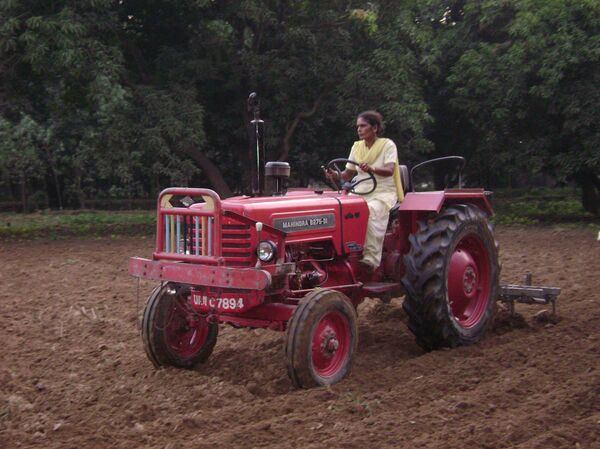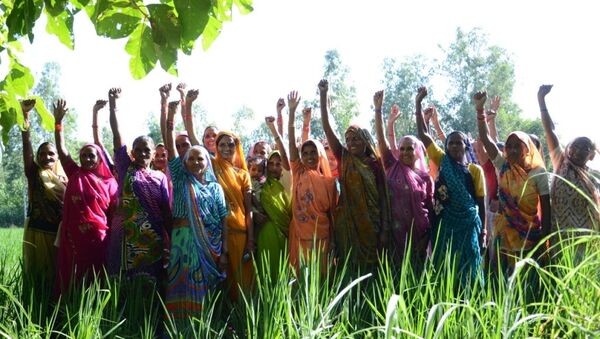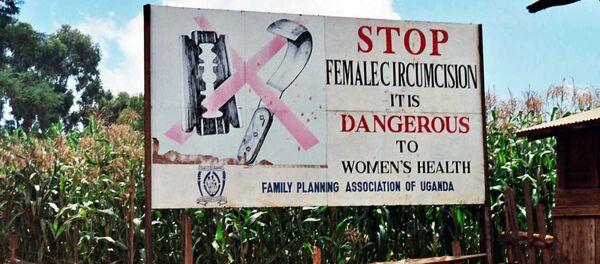Sputnik (New Delhi) — In India's eastern state of Bihar, women farmers have employed an innovative initiative of running and managing paddy sapling banks. They use an accurate scientific technique to cultivate rice saplings, just in time, and ready for transplantation. Village Square, a public-interest communications initiative focusing on rural India, reports that these women are earning a respectable livelihood by selling the saplings to small and marginal farmers.
This story emerged from the Muzaffarpur district, which was earlier in news due to a horrendous case of sexual abuse of women in a shelter for the homeless. Given that the rural landscape of India has earned notoriety for oppression and marginalization of women, such a success story is a source of inspiration for many.

A women farmers' collective in the North Dinajpur district of West Bengal is charting their route to empowerment through organic farming. They are reviving indigenous methods and also integrating practices such as duck rearing that are synergistic to rice cultivation. As per the report published by Village Square, these women were once ridiculed by their male counterparts, who chose to continue with chemical-intensive farming.
READ MORE: Indian Shelter Home Mass Rape Case: Gov’t Orders Audit of 9,500 Institutions
The latest Economic Survey of India, by the Ministry of Finance, has acknowledged that "For sustainable development of the agriculture and rural economy, the contribution of women to agriculture and food production cannot be ignored… The differential access of women to resources like land, credit, water, seeds, and markets needs to be addressed."
"Around 2005-06, the regional manager at that time found that many women had been refused credit by banks because they didn't own their agricultural lands. They were deprived of access to government schemes meant for farmers because they were not recognized as women 'farmers'. At the start of the campaign, a study was conducted to find the baseline status in Uttar Pradesh. One figure that comes to my mind now is that about 4% of landholdings were in the names of women at that time," Nand Kishor Singh, regional manager Oxfam India, recalls the state of affairs at the onset of the AAROH campaign.
READ MORE: Women Demand Entry into India's Guys-Only Sabrimala Temple
A mass-scale community mobilization drive was started to sensitize men about the benefits of transferring landholdings to women. Hardly any women appeared during the first few meetings as they were discouraged by the men in their families. Later, women were made to realize the importance of asserting their rights.
"There has been a complete feminization of the agriculture across the country. With men migrating to cities, in search of jobs, women are left to take care of the household as well as agriculture. I asked some women that suppose your husband is an alcoholic or he leaves the village, then what will happen to you and your children if you don't have ownership of the land that you depend on. This logic got their attention and soon enough they influenced other women as well to participate in our outreach meetings," Singh told Sputnik.
"The biggest achievement that happened is that the identity of women farmers was established and recognized by the government. Women started getting invitations to training programs and farmers' fairs organized by the agriculture departments and institutes. As per the study conducted at the closure of the campaign we observed that landholdings in the name of women farmers had increased to 18 percent in UP. This is still a very low figure and there needs to be a provision where the name of wife is added with the name of husband in existing landholdings," Singh added.
READ MORE: Muslim Cleric Arrested for Slapping Woman During TV Debate (VIDEOS)

"I've left behind the Suresho who used to cry and blame her destiny. I support not just my own family but I also help my other sisters in the community in farming and taking care of their livestock. I believe that when women will have money they'll be empowered. When women develop the desire to get what is rightfully theirs then they will come forward. Only a woman can feed everyone because she has compassion in her heart. Today it's needed that women do farming with full strength and conviction and assert their right," Suresho Saini says.
The views and opinion expressed by Speakers in this article are those of the speakers and do not necessarily reflect the position of Sputnik.





